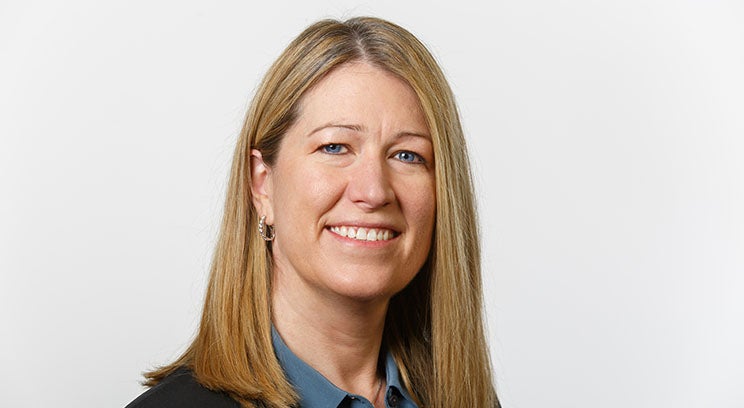
Shannon Klinger, the group general counsel of Novartis International AG, a Swiss multinational pharmaceutical company, has opened nearly every virtual meeting since Novartis took the decision to ask its associates to work from home in light of the COVID-19 pandemic — including this interview — with an earnest question: how are you doing? While the answers to this question have often varied, the key commonality has been the honesty and vulnerability expressed in the responses and the gift of human connection that the conversation creates.
“Why does it take a pandemic for us to step back and honestly ask one another such a simple question?” she muses during a recent interview with ACC Director of CLO Services Justin Connor. Klinger admits that working virtually is far from her preferred mode of work — she is usually traveling internationally two or three weeks per month — and for her it is important to honestly convey the challenges she faces in navigating the current situation with her global team to also give them the freedom to express their own challenges and find common solutions together.
“I wasn’t built to spend my time talking to a computer screen all day every day. There are days when I am the less-good version of myself, and I have to acknowledge that, accept that, and practice a bit of self-forgiveness,” she shares, also noting that she and her team know how lucky they are to be able to work remotely for a company that has pledged no COVID-related job actions and in an industry that is counter-cyclical to the current economic downturn.
Despite the physical distance, Klinger says that her global team has drawn closer during the crisis because everyone is working from home on equal footing. “I have seen kids, dogs, cats — all sorts of real life showing in our Teams calls. It’s an incredible gift,” she says.
The importance of authenticity
Forging real human connections isn’t possible without a genuine commitment to authenticity. “One of the great blessings of my journey as an in-house lawyer has been the realization that there is no corporate change without individual change,” Klinger remarks. Being honest, vulnerable, and real about what’s going on is the foundation for trust. Only after team members have established trust, can they work together effectively as a team to deliver for patients.
Klinger finds it’s easy to become overworked with her office only 10 feet away from her living room and the temptation to “just check in quickly” is ever-present. With work and home life mixing fluidly, Klinger realized that she needed to do a much better job of setting boundaries for herself in this new normal and visibly role model the same for her global team. Absent a true emergency, in which case the team knows to send her a text, she does not respond to emails between Friday evening and Sunday evening.
She also has started limiting all but the most critical meetings to 30 minutes, with 30-minute breaks in between to ensure she is getting up, moving around and able to participate in the next meeting with her full attention. Once she set such clear boundaries for herself, her direct reports started to do the same and, more importantly, as a leadership team they started talking to the global legal organization about the boundaries that they were setting, which in turn empowered others lower down in the organization to prioritize taking time for themselves.
In terms of what to expect going forward, Klinger notes the trend towards “distributed working,” which refers to a more remote workforce dispersed geographically over a wide area, and which allows individual employees to decide in which work environment(s) they can be the best versions of themselves and have the greatest impact. The technology companies seem to be early adopters of this model (some have even announced that many employees may never have to go back to the office).
One of the advantages of the current work-from-home requirements has been to force a mindset shift throughout Novartis in terms of understanding that replacing face-to-face meetings with virtually-enabled conversations in personalized office environments can lead to greater individual productivity and higher employee engagement. The same is true in her legal and public affairs functions, where more than 1,000 associates working in over 70 countries have found new and innovative ways to work together and build a sense of community all while interacting only virtually.
Klinger is committed to preserving this flexibility moving forward as a way to drive even more inclusion in the legal function. “If I have an IP lawyer who excels in patenting in the cell and gene space, I want to do everything I can to encourage them to continue to innovate in way that is best for them — wherever they are,” she says.
Similarly, at a time where legal departments around the world are being asked questions that did not even exist before COVID-19, it has never been more important to leverage technology and automate transactional legal processes to free up time for strategic thinking and innovation.
But this shift requires a high level of trust in the legal organization. Implementing AI in contract management systems and automating patent filings should free up time for new ways of thinking in law departments, but only if people do not feel overly threatened by technological disruption. For Klinger and her leadership team, it has been important to make clear that the goal is not to cut headcount — it’s about giving lawyers back hours every day to think strategically and do higher value work.
Responding to the COVID-19 pandemic
Klinger works in Switzerland, which is slowly reopening its businesses and economy. Novartis announced the re-opening of its workspaces globally effectively May 11, 2020, inviting associates to return, but also giving associates the option to continue working remotely if they feel more comfortable at home.
Klinger notes that there’s a difference between being physically capable of reopening — having the appropriate space, protective gear, etc. — and being emotionally comfortable coming into a shared space, especially when it’s clear that people can work from home, be productive and be valued by Novartis for the contributions they are making to improve and extend people’s lives.
In responding to COVID-19, the primary concern of Novartis has been the safety of associates and patients globally. For its associates, Novartis has committed to a number of actions, including no COVID-related layoffs, enhanced employee support programs and expanded learning opportunities for associates and their families through LinkedIn Learning and the Khan Academy.
Externally, Novartis is contributing to the fight against COVID-19 on multiple fronts. Among other things, it established a US$40 million COVID-19 Response Fund, co-chaired the COVID-19 Therapeutics Accelerator, coordinated by the Bill & Melinda Gates Foundation, which is not only searching for a vaccine, but also scaling up manufacturing so that enough vaccine or mitigating drugs could be supplied in sufficient quantities, and is a member of the COVID-19 direct partnership organized by the Innovative Medicines Initiative.
Inspired by her grandfather
Klinger’s grandfather, a Midwestern lawyer and judge, made a big impression on her career path. As a child, she would sit in his legal office, amazed at the volumes of legal books on the floor-to-ceiling shelves, thinking that a job where you read all day sounded perfect.
Her early practice concentrated on healthcare law, particularly qui tam actions arising under the US False Claims Act. She litigated on behalf of pharmaceutical companies, relishing the back-and-forth with the US Attorneys’ offices, debating the scope and application of the law. In the midst of preparing for a trial, she received a call from her grandfather. He had terminal lung cancer and had decided not to pursue curative measures. But he was not calling about his own situation, he was calling because he wanted the family to know his wife, Klinger’s grandmother, had been suffering from Alzheimer’s for several years.
At her grandfather’s funeral some months later, she realized the devastation caused by Alzheimer’s when her grandmother noted that it was a shame that her grandfather had to miss such a beautiful service due to work — and it became clear that Alzheimer’s had taken her ability to remember on a daily basis that her husband of 50 years had passed away.
“It was a capital-M Moment for me, and I knew I had to do more in a company to help patients,” Klinger says. She wanted work to be about more than just counting wins-and-losses or marking value by the number of hours billed. That moment led her to pursue a career in-house where her work could meaningfully contribute to making a difference for patients.
A pivotal moment in the relationship between society and corporations
Klinger is passionate about the important role corporations play in society and the importance of trust as their license to operate. She is co-chairing ACC’s Global General Counsel Summit, which is focused on championing trust in business. Klinger notes that there is a lot of cynicism toward institutions. “Society has lost trust in government. Corporations are being asked to step into the breach, and this requires corporations to ensure that they are considering any number of stakeholders in their actions moving forward.”
Klinger thinks now is truly a unique historical moment, which has united society and corporations in a common objective of curing and eradicating a global pandemic. Expectations are high, but the impact can be even higher if corporations redouble their efforts to build and establish trust in their communities, adding: “Society’s expectations are high. It’s incumbent upon us to live up to them.”
Novartis is one of the largest pharmaceutical companies in the world, with more than 109,000 employees of more than 140 different nationalities and annual revenues of more than US$47 billion in 2019. Novartis has lawyers in APAC, Canada, Europe, and Middle East/North Africa. Novartis has its global headquarters in Basel, Switzerland and is dually listed on the Swiss and New York stock exchanges.
The Novartis core values that underpin its corporate culture are innovation, quality, collaboration, performance, courage, and integrity. Shannon Thyme Klinger has been the group general counsel at Novartis since June 2018 and previously served as its chief ethics, risk, and compliance officer and head of litigation.



